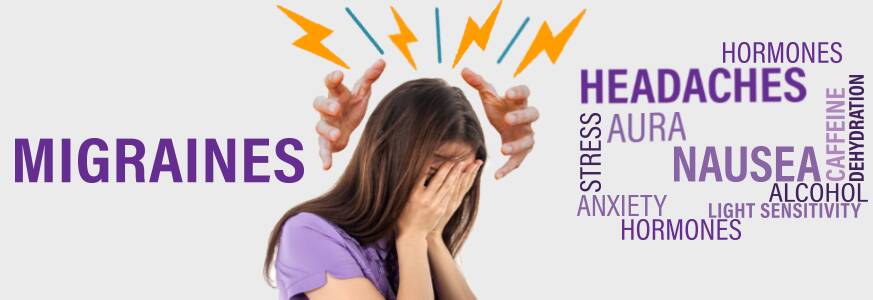
Migraines
A migraine is a more severe form of a headache causing throbbing pain on one side of your head. The symptoms will vary from person to person, but the main trigger is a painful headache. Other symptoms include: sensitivity to light, sound and smells, disturbance in vision and vomiting. The attack will also differ in the length and frequency but usually the migraine (usually without an aura) will last between 4-72 hours at most.
Migraines cause a significant hindrance in your daily lives by impacting the way you work and interactions socially and with family.
Types of migraines
- Migraine with aura – These are neurological disturbances before or during the development of the migraine. The individual experiencing this type of migraine will develop visual disturbances such as coloured spots, flashing lights, tunnel vision, or dizziness. It is a common type of migraine and the aura usually last less than an hour with no long last effects.
- Migraine without aura – Around 70-90% of people will experience this form of migraine where it occurs with no warning signs. If untreated, the effects could last between 4-72 hours with throbbing or pulsating pain. During this type of migraine, you are likely to experience vomiting or have diarrhoea and may be more sensitive to light and sound.
See our clinically proven migraine treatment
View Migraine Treatments
Safe and regulated Pharmacy
Lowest price guarantee
Fast, discreet delivery
Causes of migraines
Whilst the exact cause of migraines is not known, it is thought to be caused by changes in the levels of chemicals in the brain causing the blood vessels in the brain to widen and swell, producing the throbbing pain.
The following are thought to trigger a headache:
- Hormonal changes - Migraines are closely associated with women and they may experience migraines during menstruation due to the change in hormone levels.
- Stress – Stress and anxiety and other forms of tension are linked to having a migraine attack.
- Sleep - Sleepless nights, continuous late nights and being overly tired are thought to trigger a headache.
- Triggers in diet – Excess consumption of alcohol and caffeine will cause a migraine attack. Specific foods are also triggers for example, citrus fruits, chocolate, some cheeses and any foods with tyramine. Skipping meals or eating too many sugary foods can also contribute to a migraine attack, so it’s important that you eat healthily.
- Dehydration – Making sure you drink around 2 litres of water a day to make sure your body isn’t losing more fluids that you are taking in will help to reduce a migraine attack from occurring.
- Environment – Passive smoke, loud noises, strong smells, flickering computer screens, and changes in the climate are thought to be possible migraine triggers.
Migraine vs Headache
Although many people describe mild or moderate headaches as a ‘migraine’, there are clear differences to help distinguish a migraine from a headache.
|
Headache |
Migraine |
| Pain |
Mild to moderate pain with the feeling of an elastic band squeezing the head. |
Moderate to severe throbbing pain on one side of the head. |
| Symptoms |
Pressure around the forehead or dull head pain. |
Pain on one side of the head, sensitivity to light and sounds, nausea and vomiting. |
| How long does it last? |
30 minutes to a few hours |
Without aura: 4-72 hours
With aura: 5-60 minutes |
| Triggers |
Stress or tightness or tension in the neck or scalp muscles, cold or flu, poor posture, eye strain. |
Stress, sleep, lack of water, poor diet, changes in the environment |
Treating Migraines
Painkillers
Over the counter medication such as paracetamol or ibuprofen can help to reduce the symptoms of a migraine. It is the most effective at the beginning of a headache, and if taken when the headache worsens, the medication may not be effective at this point.
Triptans
If ordinary over the counter medication has been ineffective, you can make an appointment with your GP or alternatively you can buy medication online at Pharmica. All you need to do is complete an online medical questionnaire, similar to the questions a GP would ask in a face to face consultation. If you are suitable for the medication, you will be able to purchase the medication safely and discreetly.
Triptans work by narrowing the blood vessels around the brain to inhibit the pain of a migraine. At Pharmica, we offer a range of migraine relief medication which comes in a variety of forms such as tablets or nasal sprays. See the full list here.
Other forms of treatment include acupuncture, anti-sickness medication or if medications are not effective, seeing a specialist may help for further investigation and alternative treatments.
Living with Migraines – How to cope and manage migraines
- Keep a migraine diary - Record your symptoms, triggers, the frequency and duration and the treatment taken. This will help doctors with their diagnosis and assess whether the medication you are taking are effective.
- Exercise – Aerobic exercises which are not too strenuous can help with migraine attacks. You could start off with 30 minutes of exercise, 3 times a week.
- Sleep – Try to sleep and wake up at the same time everyday and make sure your sleep environment is as calm as possible. Cut down on using any technology before bed and avoid caffeine.
- Stress Management – You may not be able to avoid daily stresses, but you can try and control them. Take more frequent breaks to avoid feeling overwhelmed, change from a negative to a positive behaviour and try to manage your time more wisely by keeping a to do list.
If you suffer from migraines, Pharmica offers fast and effective treatment.
Find your Migraine treatment now
“Best prices I've found online. Fast and easy consultation
process with no consultation fees.”
— Ricardo